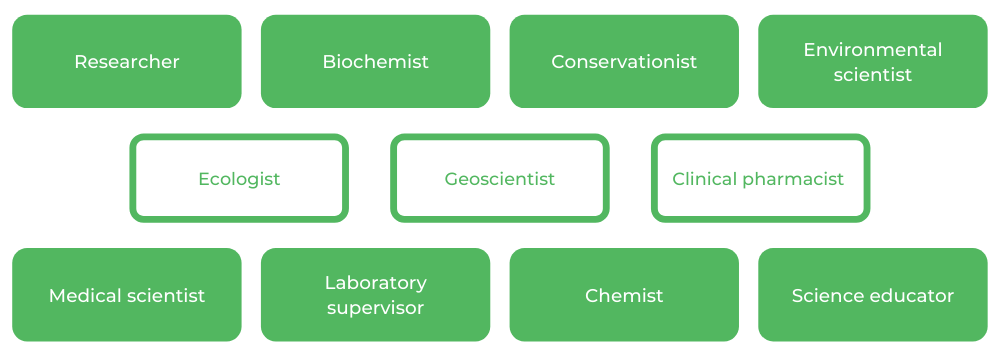So, you pretty much have all the details and info on studying a Bachelor of Science at UTS — take a quick peek here if not!
But you want to know how people really feel about this degree?
Well, we’ve got you covered! Meet Finn, a final year Science student at UTS (double degree in Environmental Science and International Studies). We had a chat about his experience studying Science and ask him all those questions you really want to know the answers to.
So, let’s get started!
Why should you study a Science degree at UTS?
Top 3 Pros of a Science Degree
Top 3 Cons of a Science Degree
Mistakes You Shouldn’t Make
Things to Know Before Starting UTS Science
What Makes this Degree Different
Motivations for Studying UTS Science
Potential Career Paths
Why should you study a Science degree at UTS?
Alongside this, the Science staff are really passionate about what they teach and the science facilities are pretty impressive (you’ll definitely want to check the superlabs out!) There’s also a whole range of interesting and different science majors you can choose to specialise in.
Top 3 Pros of a Science degree
#1: Practical experience
“I’ve spoken to some friends from other universities, and it generally seems like UTS Science students do a little more practical work in the laboratory and out in the field,” Finn told us.
“I think it’s a big bonus because it breaks up the activities and stuff for study,” he added.
Of course, there is still theory to learn and practice but UTS develops your scientific skills by getting you out and about in the field — the best way to learn!
#2: Great staff
“Depending on whichever area of science you choose, they have really good teachers and professors in every department,” Finn said.
The Science staff have worked in the industry and have lots of experience so they really know what they’re talking about!
Finn told us that it’s also a really supportive learning environment where you feel comfortable to ask questions and you don’t have to know everything.
“It’s really nice because there’s been times where I’ve had no idea what’s going on and then you just ask the teacher or professor and they clear it up — easy as,” he said.
#3: Variety of majors
Finn studies Environmental Science, just one of the nine majors on offer — so you’re bound to find a major that interests you!
There’s also the option to choose a flexible science degree in either physical sciences or life and environmental sciences which gives you a bit more flexibility to move around in terms of your degree structure. This is also really helpful if you want to do a more general science degree with a mix of subjects or perhaps don’t quite know in what area you want to specialise.
Top 3 Cons of a Science degree
#1: Working out your course structure
Finn told us that his least favourite part about the degree was figuring out the course structure.
“Sometimes picking classes can be a bit confusing so I have to go back and forth and figure out which ones are prerequisites and which I have to do for electives,” he said.
However, don’t be disheartened by this because Finn reassured us that it’s ”not too hard when you figure it out, it’s just a bit overwhelming at first.”
As long as you set aside enough time to work out which subjects you have to do before each year, timetabling will be a lot easier and you’ll have a better chance at getting those classes you want!
#2: Science faculty doesn’t have the biggest presence
Finn told us that “the Science faculty generally has less of a student presence in the university” — particularly in comparison to Business and Law.
“It would be nice to have more of a student life, although the way the degree works, you’re surrounded by so many different students all the time so it’s quite easy to make friends anyway,” he said.
So, you’ve just got to get involved and make an effort to meet people in your course — it’s so worth it!
#3: Practicals are mandatory and can be quite lengthy
Finn told us that “classes can run a bit long but that’s kind of non-negotiable”. And he’s right, it’s not necessarily a con but pracs are mandatory which means you do actually have to turn up and participate.
Anyways, it’s the only way you’ll learn all those practical scientific skills you’ll need in the future!
Any regrets?
Finn doesn’t have any regrets about his Science degree (sweet!)
The only thing that he regrets was his original choice to major in Medical Science because at the time, he “thought it was more employable”.
However, he had always been interested in the Environment and knew that’s where his passion was. So, he decided to change his major in the second year to Environmental Science.
“It was by far the best decision I made,” he told us.
What do you wish you had known before starting UTS Science?
#1: First Year is a refresher
“It’s just like a basic refresher on all the good things like physics, chemistry, biology and scientific practice,” Finn said.
You don’t specialise until the second year so the first year is a recap of all things science!
Don’t stress out if you don’t know everything or have forgotten content because that’s what this year is all about. You’ll go over the basics again and then build on from there!
#2: Don’t rush choosing your major
You don’t have to decide on your major until the end of your first year! So, make sure you really think about where your interest lies and what you’re most passionate about.
Finn gave a great piece of advice: “Study something you’re actually interested in because it will be so much more fun.”
Finn also changed his major from Medical Science to Environmental Science because that’s what he is really passionate about.
What makes this degree different from the ones offered at other universities?
#1: Focus on employment
At the end of the day, you want to get a job after leaving uni and UTS really prepares you for that — especially considering how practical and hands-on the degree is!
“I think the emphasis that they place on employing you into careers afterwards — I haven’t really seen as much in other universities as it is in UTS,” Finn explained.
“They have these Employment fairs where you can talk to people and do networking and they have a site where they post graduate jobs and internships — it’s pretty helpful for sure,” he said.
#2: Approach to learning
“The UTS general approach to education just feels a lot younger to me or more in touch with modern times,” Finn told us.
“My favourite thing is probably how technology advanced UTS is and how they implement it in all aspects of university, whether that’s the library or classes or the news buildings that we’ve got,” he said.
You’ll definitely want to check out the state-of-the-art science facilities and laboratories which are equipped with the latest technology and awesome working spaces! The Superlabs are high tech and you’ll love having pracs in these working spaces.
What inspired you to choose this degree?
In terms of choosing science, Finn didn’t exactly know what he wanted to do after high school but always had an interest in science and the natural world which is what led him to choose Environmental Science.
“I heard they [UTS] had a good reputation for science and technology and the practical aspects of the degree, even before I started — that attracted me as well,” he said.
Finn also talked with some people who studied at UTS and “everyone was really friendly and informative” which sold him on it!
What are the possible career paths?
“I originally thought that the only kind of career you can have in science was in research. I didn’t realise until my third year, that there are actually options,” Finn told us.
He added, “And that applies to all areas of science — there’s a booming industry of people and new jobs being created in all sectors.”
There’s no doubt that a Science degree opens up a ton of different career paths. So, it really depends on your major and what you’re interested in.
This is just a snapshot of some of the possible jobs you could find yourself working in:
-
- Researcher
- Biochemist
- Conservationist
- Environmental scientist
- Ecologist
- Geoscientist
- Clinical pharmacist
- Medical scientist
- Laboratory supervisor
- Chemist
- Science educator
Plus a ton of others — the list goes on and on!
Tanna Nankivell is a Senior Content Writer at Art of Smart Education and is currently in Germany completing a year of study for her double degree in Communications (Journalism) and Bachelor of Arts (International Studies). She has had articles published on Central News – the UTS Journalism Lab and wrote a feature piece for Time Out Sydney during her internship. Tanna has a love for travel and the great outdoors, you’ll either find her on the snowfields or in the ocean, teaching aqua aerobics or creating short films.





